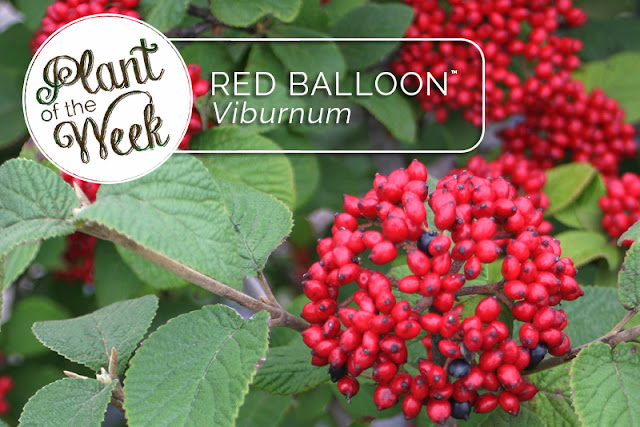99 Red Balloons
Red Balloon™ viburnum is an outstanding new selection for anyone looking for a fall fruit display. This cross between Viburnum lantana and V.rhytidiphyllum is a very showy plant with a nice compact habit. It produces tightly packed clusters of bright red fruit in late summer and fall. For the best fruiting, plant it near V. 'Mohican' or V. rhytidiphylloides.
Red Balloon viburnum is hardy to USDA Zone 4 and grows 6-8' tall and wide. It's super easy to grow, and unlike many great landscape plants, it looks good in a container. It has pretty white flowers in spring, too! Really, what's not to love about this deer-resistant plant?
Red Balloon viburnum is hardy to USDA Zone 4 and grows 6-8' tall and wide. It's super easy to grow, and unlike many great landscape plants, it looks good in a container. It has pretty white flowers in spring, too! Really, what's not to love about this deer-resistant plant?
 |
| Red Balloon viburnum's white flowers appear in April and May. |
Viburnums are wonderful plants. You'd be hard pressed to find a landscaper or nursery grower who doesn't appreciate this varied genus. Fragrance, flowers, foliage, fruit - you'll find it all in the Viburnum section.
The only problem with viburnums is keeping track of what's what. When I worked on the Spring Meadow Nursery catalog, I came to dread the viburnums. For one, it comes late in the alphabet, so there often wasn't a lot of flexibility in the pagination. Secondly, there are just so many, and the species and subspecies make for a tangled mess, especially when making cross-pollination recommendations.
Generally speaking, you want two different cultivars of the same species to get good fruiting. However (and there's always a however), cross-pollination between species happens regularly. If there was a Tinder for plants, viburnums would be on it. You do need to pay attention to flowering time, though. It's no use telling that cute viburnum that you'd like to meet it if it works the day shift and you're on nights.
The only problem with viburnums is keeping track of what's what. When I worked on the Spring Meadow Nursery catalog, I came to dread the viburnums. For one, it comes late in the alphabet, so there often wasn't a lot of flexibility in the pagination. Secondly, there are just so many, and the species and subspecies make for a tangled mess, especially when making cross-pollination recommendations.
Generally speaking, you want two different cultivars of the same species to get good fruiting. However (and there's always a however), cross-pollination between species happens regularly. If there was a Tinder for plants, viburnums would be on it. You do need to pay attention to flowering time, though. It's no use telling that cute viburnum that you'd like to meet it if it works the day shift and you're on nights.
 |
| The fall fruit of Red Balloon viburnum is an eye-catching cherry color. |
Sometimes, though, fruiting isn't what's important. Some viburnums, like V. carlesii, are grown for their fragrance. Others are grown more for their foliage: Emerald Envy® V. rhytidiphylloides and Handsome Devil™ Viburnum are two selections with outstanding foliage.
Then there are some viburnums that seem to have it all. Red Balloon viburnum, with its handsome foliage, compact habit, pretty flowers, and spectacular berry display, is one. It may not be fragrant, but this easy-to-grow variety does just about everything else you'd want a viburnum to do.
OK, so here it is: Your Big '80's Flashback. If you were really cool in 1983, you sang along in German...
Then there are some viburnums that seem to have it all. Red Balloon viburnum, with its handsome foliage, compact habit, pretty flowers, and spectacular berry display, is one. It may not be fragrant, but this easy-to-grow variety does just about everything else you'd want a viburnum to do.
OK, so here it is: Your Big '80's Flashback. If you were really cool in 1983, you sang along in German...
Plant of the Week is written by Jane Beggs-Joles.

